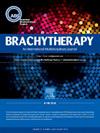国际住院医师近距离放射治疗教育现状综述。
IF 1.8
4区 医学
Q4 ONCOLOGY
引用次数: 0
摘要
简介:近距离放射治疗是放射肿瘤学领域的一项关键技术,在一些疾病部位仍然是必不可少的治疗方式。在美国进行的多项调查显示,很大一部分住院医生在毕业后不太愿意接受几种近距离治疗,这凸显了培训方面的巨大差距。为了了解美国以外是否存在类似的问题,进行了范围审查,以表征国际近距离治疗培训的状态。方法:于2024年6月8日在PubMed上进行电子检索,检索词为“近距离治疗”和“住院医师”,检索年份限制在2015年之前。在确定的8项研究中,共有1187份调查回复报告了居民对近距离治疗能力的自我评估。结果:来自多个大洲的居民调查报告了近距离治疗技能信心的高度变化,许多技术报告的信心低于50%。调查还评估了近距离治疗培训的障碍,发现低病例量和缺乏正式培训或评估是常见问题。结论:全球范围内对近距离放射治疗的低信任度令人不安,需要专门的干预措施,如建立基于能力的评估和有效的基于模拟的培训,以确保未来的放射肿瘤学家拥有在全球范围内提供安全、高质量患者护理的技能。本文章由计算机程序翻译,如有差异,请以英文原文为准。
A scoping review on the International State of Resident Brachytherapy Education
INTRODUCTION
Brachytherapy is a critical skill in the field of radiation oncology and remains an essential treatment modality in several disease sites. Multiple surveys conducted in the US suggest that a large proportion of residents do not feel comfortable performing several types of brachytherapy procedures upon graduation, highlighting a significant gap in training. To understand if similar issues exist outside the US, a scoping review was conducted to characterize the state of brachytherapy training internationally.
METHODS
An electronic search was conducted on PubMed on June 8, 2024 with a restriction on publication year prior to 2015 with the search terms “brachytherapy” and “resident.” Across the eight studies identified, a total of 1187 survey responses reported resident self-assessment of brachytherapy competence.
RESULTS
Surveys of residents from multiple continents report high variability in brachytherapy skill confidence with many techniques reporting less than 50% confidence. Surveys that also assessed barriers to brachytherapy training found that low caseload and lack of formal training or assessments were common issues.
CONCLUSIONS
These low rates of brachytherapy confidence across the globe are troubling and dedicated interventions, such as the establishment of competency-based assessments and effective simulation-based training, are needed to ensure that future radiation oncologists have the skills to deliver safe, high-quality patient care across the globe.
求助全文
通过发布文献求助,成功后即可免费获取论文全文。
去求助
来源期刊

Brachytherapy
医学-核医学
CiteScore
3.40
自引率
21.10%
发文量
119
审稿时长
9.1 weeks
期刊介绍:
Brachytherapy is an international and multidisciplinary journal that publishes original peer-reviewed articles and selected reviews on the techniques and clinical applications of interstitial and intracavitary radiation in the management of cancers. Laboratory and experimental research relevant to clinical practice is also included. Related disciplines include medical physics, medical oncology, and radiation oncology and radiology. Brachytherapy publishes technical advances, original articles, reviews, and point/counterpoint on controversial issues. Original articles that address any aspect of brachytherapy are invited. Letters to the Editor-in-Chief are encouraged.
 求助内容:
求助内容: 应助结果提醒方式:
应助结果提醒方式:


